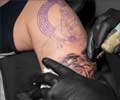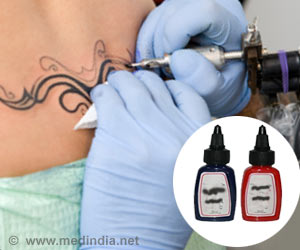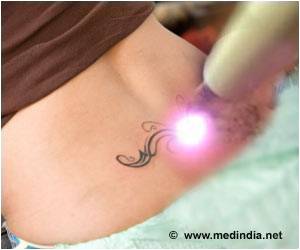The American Association of Pediatrics details possible medical complications associated with tattoos, body piercing and scarification.

‘Tattoos and body piercings are an increasingly popular form of self-expression, but it is important for young people to carefully consider the consequences.’





The clinical report details possible medical complications, which, while uncommon, should be discussed with a pediatrician. "Tattooing is much more accepted than it was 15 to 20 years ago," Dr. Breuner said. "In many states, teens have to be at least 18 to get a tattoo, but the regulations vary from place to place. When counseling teens, I tell them to do some research, and to think hard about why they want a tattoo, and where on their body they want it."
The AAP report highlights include:
- While societal acceptance of tattoos and piercings has increased, there may still be repercussions. In a 2014 survey, 76 percent of 2,700 people interviewed said they believed that a tattoo or piercing had hurt their chances of getting a job.
- The rate of complications from tattoo placement is unknown, but believed to be rare. The most serious complication from any form of body modification is infection.
- Before getting a tattoo or piercing, make sure the salon is sterile, clean and reputable. The facility should be regulated by the state and provide clients with information on how to care for the area that has been tattooed or pierced afterward. The facility should practice infection control just like at the doctor's office.
- Scarification, which involves cutting, burning or branding words or images into the skin, is not as highly regulated as tattooing or piercing and is prohibited in some states.
- Someone considering a tattoo should make sure that their immunizations are up to date and that they are not taking any medication that compromises their immunity.
The syndrome, which includes cutting, scratching or burning oneself, is a more impulsive or compulsive action that is associated with mental health disorders.
"In most cases, teens just enjoy the look of the tattoo or piercing, but we do advise them to talk any decision over with their parents or another adult first," said David Levine, MD, co-author of the report.
Advertisement
Laser removal of tattoos can range from $49 to $300 per square inch of treatment area, according to the report. "Reputable tattoo parlors and piercing salons should provide a long list of do's and don'ts on how to care for the area that was worked on, and what signs might indicate a problem," Dr. Breuner said.
Advertisement
Source-Eurekalert











